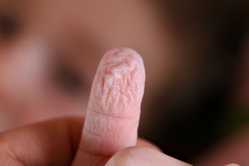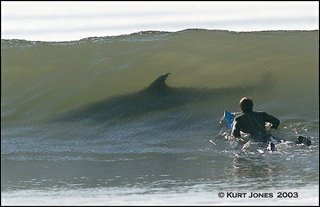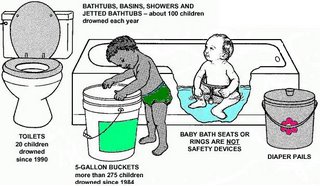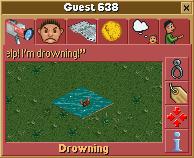Tuesday, August 22, 2006
Kenapa gue males mandi? by mister oki :p
Hazards of bathing.
* Drowning is one possible danger of bathing. In a shower bath drowning has been known to occur, even though the risks are less than in an immersion bath. Baths that have standing water involve a higher risk of drowning.
* Heatstroke can also result from the use of sauna baths or other hot baths.
* Hypothermia from using cool baths and not being sensitive to the cold or because of falling asleep, etcetera.
* Ear infections, also known as swimmer's ear can result from water building up and the resulting increase in bacteria.
* Impact injuries are also possible from landing inappropriately in a bath, from an elevation, or from collision with other bathers, or with the sides of the bath.
* Irritation caused by bathing solutions or other cosmetic products.
* Infection caused by sharing dirty bathwater or bathing with others.
* Collapsing when getting out of the bath because of the sudden change in blood pressure can occur, particularly when the bath is hot. Fainting can lead to accidents (including drowning if one falls back into the bath).
* With advanced age, some people experience a diminished ability to sense temperature, and must use extra care to avoid accidentally scalding themselves while bathing. Caution is needed with children as well, as their body is much more sensitive to temperature and pain and they are more vulnerable to changes in temperature; this is particularly the case with babies.
* Bathing infants too often has been linked to the development of asthma or severe eczema according to some researchers, including Michael Welch, chair of the American Academy of Pediatrics' section on allergy and immunology
http://en.wikipedia.org/wiki/Bathing
SAVE WATER DON'T SHOWER!
Hampir selajur dengan wacana air dan teman2nya. Mister OKI menyumbangkan 11 alasan mengapa beliau males mandi. Layak dijadikan panutan bagi anda yang benar2 takut bersentuhan dengan air pagi pagi... :)
SAVE WATER! DON'T SHOWER!!!

1. Mandi itu penting...

2. Tapi boros air...

3. Nanti air di dunia abis...

4. Juga bisa menyebabkan polusi dari deterjen...

5. Dan kerusakan ekosistem...

6. Kalo lama-lama mandi...

7. Bisa bikin jari keriput...

8. Atau seluruh badan jadi keriput...

9. Daripada boros mendingan mandi cuma kalo gerimis...

10. Atau pas ujan sekalian...

11. Makanya gue males mandi kecuali kalo ada temennya...
Beberapa Kerugian Tidak Bisa Berenang. Part 02.
Hmm... setelah dipikir lebih masak lagi dan berkat balabantuan kiriman gambar dari mister Oki, didapatlah beberapa kerugian (atau keuntungan??) tidak bisa berenang... diantaranya :

1. Gak bisa buat gelembung-gelembung dari belakang..

2. Gak bisa liat pertunjukan dolphin untuk 17 tahun ke atas begini..

3. Gak bisa liat yang tersembunyi di lautan kayak gini..

4. Gak juga bisa liat siapa yang suka nongkrong di dalam sana..

5. Gak bisa mampir ke Krusty Krab...
Sunday, August 20, 2006
Beberapa Kerugian Tidak Bisa Berenang. Part 01.
Hmm... setelah dipikir masak masak.. ternyata ada beberapa kerugian dari tidak bisa berenang, dan males nyemplung ke air... Beberapa yg terpikir adalah ...
 1. Tidak bisa mencoba berbagai swimwear dahsyat bin jijai kayak gini.. (untung apa rugi ya? hmm..)
1. Tidak bisa mencoba berbagai swimwear dahsyat bin jijai kayak gini.. (untung apa rugi ya? hmm..) 2. Hilangnya kesempatan berada di tengah tengah kerumunan kayak gini... padahal spot tengah masih kosong ..
2. Hilangnya kesempatan berada di tengah tengah kerumunan kayak gini... padahal spot tengah masih kosong .. 3. Gak pernah bisa ikutan main pasir sama yang beginian kalo gak pernah nyentuh pantai ...
3. Gak pernah bisa ikutan main pasir sama yang beginian kalo gak pernah nyentuh pantai ... 4. Gak bisa ikutan manjat pohon kelapa dan minum kelapa muda bareng yang kayak gini ...
4. Gak bisa ikutan manjat pohon kelapa dan minum kelapa muda bareng yang kayak gini ... 5. Dan juga gak bisa naik kuda dgn yg model begini setelah puas minum kelapa muda di atas pohon ..
5. Dan juga gak bisa naik kuda dgn yg model begini setelah puas minum kelapa muda di atas pohon ..Jadi? :)
Tips n Tricks

Beberapa advis kewl buat segala tempat kalo mo nyebur2 atao mo deket2 aer... hehehe, pengecualian buat oom OKI!! tidak ada untuk bak mandi utk yang poin2 diatas hehehehe :p mungkin di bawah ada :D
For the pool:
- Always have an adult watch you when you are in the pool — even in your own backyard. Never go in the pool if there is no adult around.
- Gates are around pools for a reason — to keep kids away from the water when there isn't a lifeguard or adult around to watch them. Never go through any pool gates when they are closed. Stay safe and stay out!
- Always obey pool rules.
- Swim with a buddy.
- If you're learning to swim, ask your mom or dad to make sure your flotation devices are Coast Guard approved.
- Walk slowly in the pool area. Don't run.
- Swim at a depth that is safe for you. If you're just learning to swim, stay in the shallow end.
- Don't push or jump on others. You could accidentally hurt someone or yourself.
- Toys to help you float come in many shapes and sizes (an inner tube, air mattress, or beach ball, for example). Although they are fun and can help you while you learn to swim, what they can't do is save a life. They're toys that can lose air or float away.
- Don't chew gum or eat while you swim — you could choke.
- Never swim alone!
- Always swim where a lifeguard can see you and in areas that are marked for swimmers to use.
- Wear protective footwear if surfaces are rough or rocky.
- Don't swim out too far.
- Never pretend to be drowning. The lifeguard may take you seriously.
- Don't swim close to piers — those big, wooden structures that jut out into the water. If the water moves suddenly, you could hit a piling or a rock.
- Store drinks in plastic containers at the beach — broken glass bottles and bare feet don't mix.
- Face the waves, instead of turning your back on them. Then you'll know what's coming.
- Wear a life jacket if you don't know how to swim or if you're not a strong swimmer.
- Read all of the signs before going on a ride. Make sure you are tall enough, old enough, and don't have any of the medical conditions that are listed. If you have questions, check with a parent or ask the lifeguard.
- Always make sure there's a lifeguard at each ride and listen to his or her instructions. Wait until the rider ahead of you has passed a safe point for you to go down the slide.
- Always go down the water slide face up and feet first. This is the safe and correct way to ride.
- When you go from ride to ride, don't run — it's slippery! Also, remember that each ride is different. Read each sign and note how deep the water is in the pool.
Mmmm... bisa dipraktekkan gak ya, gue tambahin ndiri deh..
For the kamarmandi :
- Do not wear/use any footwear or glassware when you go into a bathroom. Leave them outside.
- Read all of the signs before walking into a bathroom. Make sure you are a man in a gents-room. Or make sure you are a woman if you prefer ladies-room. If you have questions, just ask anybody inside the room, if it's a gents-room or ladies-room.
- Always make sure there're loads of water to do flush in the closet. and listen to the sound it makes. Wait until those things you had left in the closet were really really left.
- When you think you gotta go, don't run — it might slippery!
- Wear protective footwear if surfaces are rough, rocky or slippery.
- Never pretend to be drowning.
- Face the closet, instead of turning your back on them. Then you'll know what's coming.
- If you have an adult watch you when you are in the bathroom — or even in your backyard. And caught you naked. Stare back at him/her. He/she might think that you are a memory of his/her past. Hantu maksudnya ... pardon my english :p
- Don't push or jump on others. You could accidentally hurt someone or yourself.
- Toys to help you take a bath for a period of time. That surely helps people to get to know water very well. A rubber duck for an example. They do float.
- Don't eat spaghetti or steak while you're in the closet — you could want more.
gak jelas??? hehehehehehe interpretasi sendiri sazzzaaaa....
Dari www.kidshealth.org ... :)
Why Is It Important to Be Safe in the Water?
Fish are able to live and breathe under water, but people need air to breathe. People drown when too much water gets into their lungs. When that happens, the lungs can't carry enough oxygen to the brain and the rest of the body.
Drowning is the second most common cause of death from injuries among kids under the age of 14. Drowning can happen so fast — sometimes in less than 2 minutes after a person's head goes under the water. That leaves very little time for someone to help.
Many drownings and near drownings occur when a kid accidentally falls into a swimming pool. But accidents can happen anywhere — at someone's home or even at your own house, and that's why you need to know how to be safe around water.
Comment:
Ugh... dijelaskan jelas2 utk under the age of 14 ! Masih ngeyel juga dimasukin kemari... udah deket kepala tiga lo men!!
Friday, August 18, 2006
Mengapa?
pertanyaan standar dalam hidup. why? mengapa? naha? ngopo? dan lain-lain bahasa dunia. (padahal cuma tau segitu doang..). langsung ke pertanyaan inti.
Mengapa takut air?
Mengapa tulis blog?
Mengapa saya tidak berjanggut?
dan mengapa-mengapa lainnya. terhembus-hembus oleh seorang Ruthnella (http://ruthnella.blogdrive.com), akhirnya tercetus ide utk bikin ini. ketebak sih gak bakal berumur panjang ini blog. cuma pelampiasan hati dan bahan cengiran di sore hari.
Padahal kepingin seperti gambar di sebelah... kapan aku bisa seperti itu ya....
dan sepertinya ada yg salah dengan judul blog. Papa Mama siapapun tidak patut dipertanyakn mengapa? untuk suatu hal takut akan air... karena yang bertanggung jawab sebetulnya adalah diri anda sendiri. mengapa anda takut air??
 Apakah karena sepert gambar di samping? waktu dulu belajar selalu menghadap ke atas... jadinya cuma tau ngambang doang.. gak tau air tuh gimana... hmmm. tanda tanya besar bagi bayi kecil sepertinya.
Apakah karena sepert gambar di samping? waktu dulu belajar selalu menghadap ke atas... jadinya cuma tau ngambang doang.. gak tau air tuh gimana... hmmm. tanda tanya besar bagi bayi kecil sepertinya.yah. anyway. this is just a start. masih banyak mengapa? lain di sana. sekarang yg terpikir nambah satu. kapan ya aku belajar berenang?
kapan ya?









